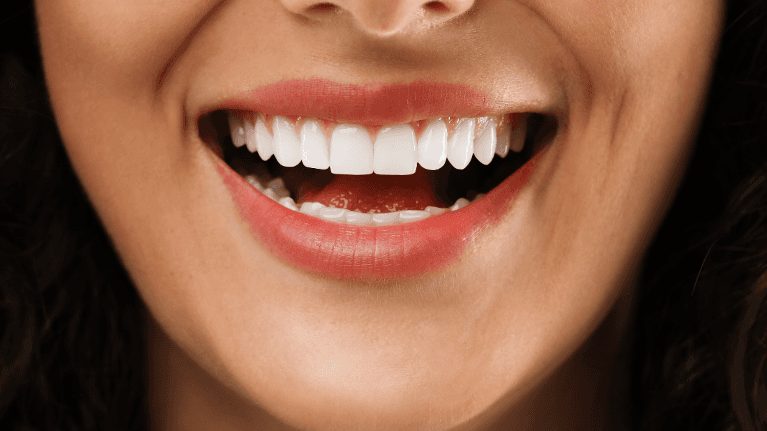
Dental veneers are custom-made shells, typically made of porcelain or composite resin, shaped and bonded to the front exterior of your teeth. Often referred to as a cosmetic dental procedure, veneers help correct numerous issues, including chipped, discolored, misaligned, or irregularly shaped teeth.
Veneers themselves don’t cause any damage to your teeth. The application process simply involves removing a thin outer layer of enamel, which ultimately will not weaken or damage the tooth.
What Makes Veneers So Appealing?
People often choose veneers to enhance the appearance of their smile by correcting various cosmetic or dental issues. They offer a durable and relatively low-maintenance solution for improving the overall look and feel of one’s smile.
- Cosmetic improvements – veneers are a popular choice for addressing imperfections like diastema and misaligned teeth. They also effectively cover discolored or stained teeth that don’t respond well to whitening treatments.
- Repairing damage – veneers can be applied to repair chipped or cracked teeth, providing a strong and natural finish.
- Durability and longevity – compared to other dental restorations, such as fillings, veneers are known for their robustness and longevity, often lasting for many years.
- Minimally invasive – the veneers application process typically involves removing a small amount of tooth enamel. However, it is less invasive than other restorative procedures, such as crowns and fillings.
- Easy maintenance – veneers are relatively easy to care for, only requiring regular brushing and flossing, just like natural teeth.
What Happens to Teeth Under Veneers?
After application, the teeth underneath are mostly protected from staining and damage. They are, however, still susceptible to decay if proper hygiene is not maintained. The veneers won’t cause damage to your teeth, but cavities can still form if the veneer is improperly sealed.
The tooth underneath remains alive and functional. It still requires the same level of care as your other teeth. Veneers don’t protect against decay, so poor oral hygiene can lead to cavities around the edges of the veneer or even affect the tooth underneath. If this happens, your dentist may remove and replace the veneer.
Another vital consideration is tooth sensitivity. Some people experience temporary sensitivity to hot or cold after receiving their veneers, especially in the first few weeks. This sensation typically subsides over time, usually within one to two weeks.
With proper care, such as brushing, flossing, and regular dental checkups, the teeth under your veneers can remain healthy for many years. Veneers offer a long-lasting cosmetic solution, but they rely on the strength and health of your natural teeth, making daily maintenance essential.
FAQs About Veneers and Tooth Health
How long do veneers last?
Veneers can last up to ten years if properly cared for. They do not require special care, except for brushing, flossing, and regular cleanings by an oral hygienist.
What are the common reasons for veneer replacement?
Porcelain veneers are durable and generally do not break under normal circumstances. If gums recede to expose the root of the tooth, patients may want new veneers to cover the visible root.
Will my veneers match my natural teeth?
We address this concern during your consultation. If you only require one veneer, then we match the color to your existing teeth. When opting for a full set of veneers, most patients usually prefer a few shades whiter than their natural tooth shade. Whatever your requirements, we make sure your veneers look as natural as possible.
Will I need gum contouring?
In some cases, gum contouring can enhance the overall appearance by creating symmetry and making shorter teeth look longer. The procedure is typically painless and does not cause discomfort during or after the application of veneers.
Are there any habits I should avoid?
We strongly advise against nail biting, using your teeth to open packaging, and any other activities that could damage your teeth.
What happens if my veneer comes off?
It could happen, though it’s rare. Try not to panic. Do not attempt to reattach it with glue. Save the veneer and make an appointment with us immediately. Your tooth may be sensitive to hot or cold temperatures, so we will schedule an appointment as soon as possible to help alleviate prolonged discomfort.
What foods can I eat? Are there any to avoid?
You can eat most food, although each patient has a different bite. We recommend eating soft foods for the first few days to get accustomed to your new bite position. Common foods we don’t recommend eating are hard candy, nuts, popcorn, and ice.
What happens if the tooth underneath starts decaying?
Minor decays can be repaired without affecting the veneer. For extensive tooth decay, we may need to remove the veneer to drill and fill the tooth and then place a new veneer over the affected area.
Can veneers weaken my teeth?
Veneers cannot weaken your teeth. We remove a thin layer of enamel from the tooth to create an adhesive surface, allowing your tooth to retain its strength.
Book Your Consultation With Dr. Nargiz Zadeh
Veneers and bonding materials won’t damage your natural teeth. They’re an excellent way to enhance your smile while preserving more of your tooth structure compared to crowns. Although a small amount of enamel is removed to ensure the veneers fit and bond correctly, they are considered a permanent solution.
While durable, veneers don’t last forever. You’ll need to replace them if they become damaged. Without proper care, the teeth underneath can also be at risk of decay. To keep your veneers in good condition, maintain excellent oral hygiene. Brush and floss daily, and avoid habits like teeth grinding, which can shorten their lifespan. Discuss a custom-fitted mouthguard with your dentist to help protect your teeth.
Dr Zadeh is dedicated to each patient, and we assure you of our best service and attention at all times.